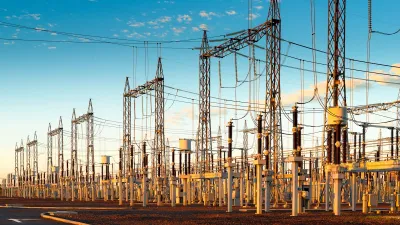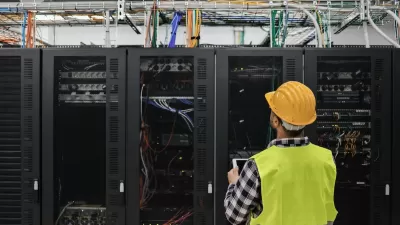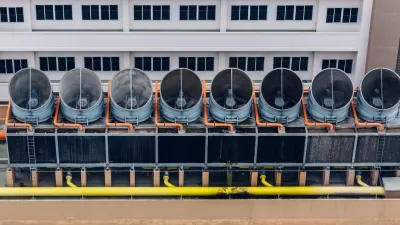Environmental groups voice concern that the states large, and growing, number of data centers is putting unsustainable pressure on natural resources and utility infrastructure.

A coalition of environmental and land-use organizations in early December called for an increase in regulation on the human health and environmental effects of the data center industry. The newly formed group, called the Virginia Data Center Reform Coalition, represents concerned residents who “have begun clamoring for more guardrails, scrutinizing the tradeoffs data centers bring to their community,” writes Jake Bolster of Inside Climate News.
Thanks to large amounts of available land and tax incentives to attract tech companies over the last two decades, Virginia’s northeast corridor hosts the world’s highest concentration of data centers: buildings or groups of buildings that house computing machines and their related hardware equipment. Virginia’s data centers generate over half a billion dollars in state tax revenue and account for nearly 70 percent of global internet traffic. Data center operators there include tech giants like Amazon, Google, Meta, and Microsoft.
“But as more companies build more data centers that handle increasingly large volumes of complex internet traffic, energy and water and land-use demands from those facilities have skyrocketed,” reports Bolster. This puts massive pressure on local utilities and impacts air quality, water supply, and progress toward the state’s climate goals.
The Virginia Data Center Reform Coalition is calling upon legislators in Virginia to study the cumulative impact of data centers, increase state oversight over data centers’ regional impact assessments, and ensure the costs of building and operating new grid infrastructure to serve data centers is paid by technology companies, not ratepayers.
The coalition stresses their aim is to reset the relationship between Virginia and the data center industry—not drive the industry out of the state,” writes Bolster.
“Our regulatory oversight is behind other large markets in Europe and Asia,” Julie Bolthouse, director of land use at the Piedmont Environmental Council, told Inside Climate News. “We need to catch up.”
FULL STORY: Virginia Environmental Groups Form New Data Center Reform Coalition, Call for More Industry Oversight

Planetizen Federal Action Tracker
A weekly monitor of how Trump’s orders and actions are impacting planners and planning in America.

Restaurant Patios Were a Pandemic Win — Why Were They so Hard to Keep?
Social distancing requirements and changes in travel patterns prompted cities to pilot new uses for street and sidewalk space. Then it got complicated.

Maui's Vacation Rental Debate Turns Ugly
Verbal attacks, misinformation campaigns and fistfights plague a high-stakes debate to convert thousands of vacation rentals into long-term housing.

In California Battle of Housing vs. Environment, Housing Just Won
A new state law significantly limits the power of CEQA, an environmental review law that served as a powerful tool for blocking new development.

Boulder Eliminates Parking Minimums Citywide
Officials estimate the cost of building a single underground parking space at up to $100,000.

Orange County, Florida Adopts Largest US “Sprawl Repair” Code
The ‘Orange Code’ seeks to rectify decades of sprawl-inducing, car-oriented development.
Urban Design for Planners 1: Software Tools
This six-course series explores essential urban design concepts using open source software and equips planners with the tools they need to participate fully in the urban design process.
Planning for Universal Design
Learn the tools for implementing Universal Design in planning regulations.
Heyer Gruel & Associates PA
JM Goldson LLC
Custer County Colorado
City of Camden Redevelopment Agency
City of Astoria
Transportation Research & Education Center (TREC) at Portland State University
Jefferson Parish Government
Camden Redevelopment Agency
City of Claremont





























